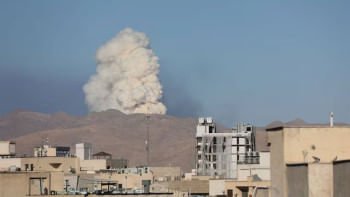Beijing's Brave Face on its Missing Lama from Tibet
THE fourteen-year-old 17th Lama's flight, (the Lama properly known as the Karmapa, head of the Karma Kagyu religious order) from Tibet to Dharmasala (India) on 5th January must have embarrassed China. Since then the Karmapa, having met the Dalai Lama, had left Dharmasala for an unknown destination in India.
Both the Dalai Lama and the Karmapa are regarded by their followers as the living presence of Buddha. The Karmapa's Kagyupa sect, known as "Black Hats", once Tibet's most powerful school, was replaced by the Gelugpa school of the Dalai Lamas 350 years ago.
The teenage-Karmapa is the first leading reincarnation of a holy person, to be officially recognised by China. He is also the only Tibetan Lama on whom the Dalai Lama and China have agreed. The Karmapa's monastery was located 70km north of Lhasa, Tibetan capital.
It is reported that the Karmapa was able to elude his Chinese watchful guards at the 800-year old monastery in central Tibet by declaring his intention to go on a retreat. He and a few monks set across the mountains on December 28, trekking more than 2000km for days along rocky paths. A jeep and other modes of transport were used later.
The Karmapa's flight with a few monks is the most significant since the Dalai Lama fled Tibet in 1959 after the Tibetan uprising failed against the Chinese rule in Tibet. When the young exhausted Karmapa with scraped hands and blistered feet reached northern India, his followers in Dharmasala were ecstatic with joy. The Karmapa's predecessor the 16th Lama also fled with the Dalai Lama in 1959.
Those close to the Karmapa said that he was increasingly frustrated at not being allowed to meet his teachers to obtain the instructions necessary for his religious top position. Chinese authorities alleged to have denied repeatedly a visa to his principal teacher, Tai Situ Ripoche who has a monastery near Dharmasala in India.
China's State Council Information office acknowledged that the Karmapa had left his monastery with " a small number of followers". The office said the Karmapa went abroad to get musical instruments and a black hat - the symbol of his spiritual power believed to be woven from the hair of female deities. The state-run Xinhua News Agency cited a letter saying he did not mean " to betray the state, the nation, the monastery or the leadership."
The followers in Dharmasala claim that the Karmapa has been groomed as a "patriotic" tool by Beijing in its campaign to suppress Tibetan independence but his escape will increase international pressure on the Chinese to ease their total control over Tibet. They alleged that the Karmapa joined other monks who had been recently pouring over the Himalayas in their hundreds, escaping the latest crackdown on religion in Tibet. It is expected that the five million Karma Kagyupa Buddhists worldwide are expected to denounce China publicly for oppressing their sect.
China is increasingly facing problems with organised religions. Recently Catholics aligned with China's Communist Party ordained five Bishops not recognised by the Vatican in Rome. The Muslims in northwest in China are reportedly faring no better. It is alleged that religious schools have been closed and last month 11 men in Xinjiang were convicted of "separatism" and two were sentecnced to death. Besides, China is being confronted by Falun Gong movement which is related to intangible notions of legitimacy and the rights of individuals. Although Falun Gong combines particular exercises with forms of meditation and spirituality, it is considered a direct threat to Communist Party rule. The state apparatus has in the past been able to prevent any groups emerging around which opposition could coalesce.
This incident of the Karmapa's daring defection is likely to put China in an uncomfortable position. One of the fall outs could be to develop its strained relations further with India. China always suspects India's motive to provide refuge to the Tibetans in India. India, on the other hand, claims that it is tradition-bound to open its arms to refugees, irrespective of the country and religion.
The flight of the Karmapa could be seen by others as China's failure to implement its policy on religion. Columbia's professor and friend of the Dalai Lama, Robert Thurman, said the Karmapa's flight "reveals the shambles of China's policy of trying to manage religion." The flight is not only an embarrassment to China, but also may cast doubt on its continuing to rule in Tibet. The incident demonstrates that the people in China would continue to search for religion to infuse their lives with meaning and that could well be a danger in the long term to the Communist Party. The import of the saying in the Bible "Man does not live by bread alone" is not lost.
The author, a barrister, is Former Bangladesh Ambassador to the United Nations, Geneva.

 For all latest news, follow The Daily Star's Google News channel.
For all latest news, follow The Daily Star's Google News channel. 



Comments